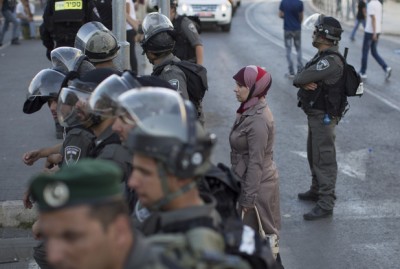Israel Orders Wife of Palestinian Jailed for Facebook Comments Expelled from Jerusalem

Image: A Palestinian woman stands stand near an Israeli checkpoint during a “Jerusalem Day March” held by Israeli nationalists to celebrate 48 years since the occupation of East Jerusalem, 17 March. (Faiz Abu Rmeleh / ActiveStills)
Israeli occupation authorities delivered an order to Muna Shalabi, the wife of a recently sentenced Palestinian prisoner, informing her that they intend to expel her from her hometown of Jerusalem for “security reasons.”
Shalabi, 43, is from the Sawaneh neighborhood of occupied East Jerusalem, and was informed by Israel’s interior ministry that she must leave the city for an unspecified amount of time, according to the publication Arab48.
Shalabi’s husband Omar, 44, was earlier this month sentenced to nine months in an Israeli prison after an Israeli court found him guilty of “supporting terrorism” and “incitement” for comments he wrote on Facebook last December.
Omar, the former secretary of Jerusalem’s branch of the Fatah political party, was one of eight Palestinians from the city arrested in December for Facebook comments.
The court cited “statuses” and comments he wrote in support of armed activities against Israelis following the kidnapping and murder of 17-year-old Muhammad Abu Khudair by Israeli settlers last July, according to the Israeli daily Haaretz.
Sami Deis, a 27-year-old Palestinian Jerusalemite who was arrested at the same time as Shalabi, was sentenced to eight months in prison for similar charges relating to a Facebook page – titled “Death to Israel” – that he created and administered.
“Worry and fear”
With Omar in prison, Muna is the sole parent taking care of their six children, who are aged 7-22 years old, Arab48 adds.
Held in Gilboa prison in northern present-day Israel, Omar is one of an estimated 5,820 Palestinian political prisoners in Israeli lockup, according to the Ramallah-based prisoner support group Addameer.
The order does not specify the “security threat” that his wife poses — she has not been accused of any crime — by remaining in their family’s home. Although Israel’s interior ministry claims that it gave her 21 days to appeal the order, Shalabi denies that she was given any such opportunity.
Since receiving the order, Muna and her children have lived in “a situation of worry and fear” and she “appeals to relevant human rights and legal institutions and the international community for quick intervention … to stop Israel’s ethnic cleansing policies against Jerusalemites and [Palestinians’] presence in Jerusalem,” Arab48reports.
Israel’s practice of banning Palestinians from Jerusalem is nothing new.
In December 2014, five Palestinian activists from Jerusalem were banned from the city. Among them was Daoud al-Ghoul, a 31-year-old activist and tour guide.
Six days after receiving the original banning order, al-Ghoul received a military court decree in Ramallah, where he had relocated, banning him from the occupied West Bankin its entirety, as The Electronic Intifada reported at the time.
Al-Ghoul has since lived in Haifa, a coastal city in central present-day Israel, and is unable to continue his work as a tour guide for the time being.
Residency revoked
More than 300,000 Palestinians live in neighborhoods throughout East Jerusalem, where they regularly endure harassment and violence by Israeli occupation forces andsettlers alike. Palestinians native to the city are treated by Israeli occupation authorities as if they, not Israel which occupied the city in 1967, are the newcomers.
Banning Palestinians from the city is just one of several methods Israel employs to expedite the ethnic cleansing of Jerusalem and push the indigenous population out. Israel also regularly demolishes Palestinian homes in the city and revokes Palestinians’residency status.
Since Israel’s military occupation of the city in 1967, at least 14,416 Palestinians have had their residency revoked, according to the Israeli rights group Hamoked. In 2014 alone, Israel revoked the residency of 107 Palestinians from East Jerusalem, among them 56 women and 14 children.
These revocations have a much greater impact than on the individual targeted, as they often split married couples from each other and parents from children. Families are left with the prosepct of leaving the city en masse in order to stay together.
Thousands of children living in East Jerusalem do not carry residency papers and are thus denied access to healthcare, education and other basic services, as The Electronic Intifada has reported in the past.
In November 2014, Israel’s interior ministry revoked the residency of Nadia Abu Jamal, the wife of a Palestinian who was killed while attacking Israeli worshippers in a Jerusalem synagogue. That attack resulted in the deaths of five Israelis.
The decision came amid a harsh crackdown by Israeli occupation authorities on Palestinians in East Jerusalem.
“The formal phrase ‘permanent residency’ is misleading,” the Israeli human rights group B’Tselem observed in a press release following Abu Jamal’s residency status being revoked.
“This status is far from permanent, as evinced by the recent revocation and by thousands of previous cases of revocation,” the group continued. “The only permanent thing about this status is its temporary nature and instability.”

